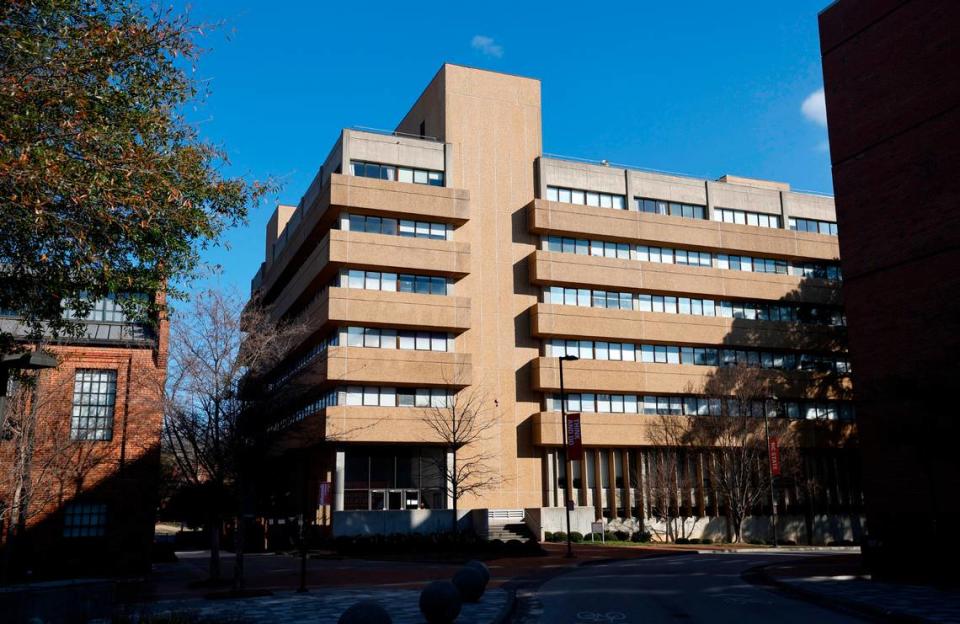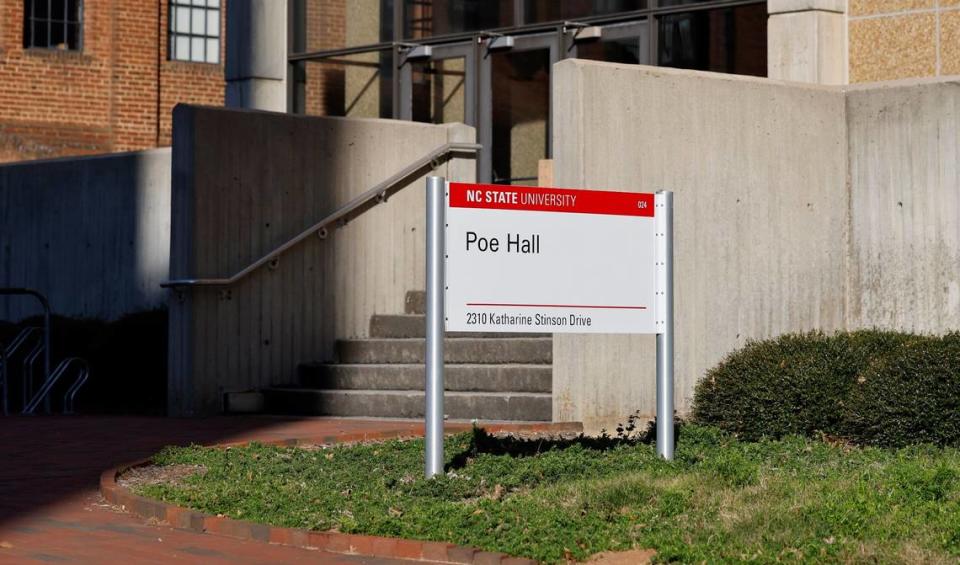Poe Hall timeline: When did NC State know about PCBs? What’s happened since then?
Since NC State University announced the presence of toxic chemicals in Poe Hall late last year, the situation has prompted questions and concerns from faculty, staff and students who worked and studied in the academic building.
Test results conducted in the fall showed the presence of PCBs, or polychlorinated biphenyls — toxic, man-made chemicals that were banned from being produced in the United States in 1979. Commonly used in commercial building materials, the chemicals are still present in some buildings constructed prior to the federal ban on their production.
Poe Hall, which houses the College of Education and the psychology department, was built in 1971.
The chemicals, depending on the quantity present and the length of exposure, can affect the immune, nervous and reproductive systems, among other health effects. They are also linked to cancer and considered to be “probable human carcinogens,” according to the Environmental Protection Agency.
Faculty and staff concerns have been further spurred by what they feel is a lack of information — including potential health impacts they could experience — provided to them by the university. NC State Chancellor Randy Woodson has acknowledged the concerns and committed in February to sharing information more often.
As the university continues to deal with the issue, here’s a timeline of key events related to the building and the university’s handling of it so far.
Timeline of events related to NC State’s Poe Hall
▪ August 2023: The university initiated environmental testing and assessments in the building “in response to a concern raised in August about indoor air quality resulting from an ongoing renovation project,” a message from Provost Warwick Arden and Vice Chancellor Charles Maimone on the university’s website dedicated to the Poe Hall closure states. It is unclear who raised the question or exactly when in August the question was raised.
▪ Sept. 25, 2023: The North Carolina Department of Labor informed NC State that the state Occupational Safety and Health Division “received a complaint concerning alleged health and/or safety hazards” at Poe Hall.
The complaint form attached to NCDOL’s letter to NC State stated that Poe Hall employees “have not been informed of the presence, location and quantity of asbestos-containing materials, despite ongoing renovations and asbestos abatement being conducted,” and that “there are concerns that employees may be exposed to lead-based paint and possibly PCBs, based on the age of the building, and ongoing renovations being conducted.”
It is unclear who submitted the complaint and exactly when they did so. NCDOL spokesperson Erin Wilson told The News & Observer that the complainant filled out an online complaint through the federal Occupational Safety and Health Administration website and the federal agency forwarded it to NCDOL.
“We have not determined whether the hazards, as alleged, exist at your workplace; and we are not conducting an investigation, at this time,” NCDOL told NC State in the letter. “However, since allegations of violations have been made, you should investigate the alleged conditions and make any necessary corrections or modifications.”
▪ Oct. 5, 2023: NC State contacted the North Carolina Department of Health and Human Services “regarding concerns about breast cancer cases in people who spent time in Poe Hall,” NCDHHS spokesperson Kandice Scarberry told The N&O.
Upon the university making contact with NCDHHS, Scarberry said, the health agency “offered to conduct a walkthrough environmental assessment of Poe Hall.”
“However, NC State contracted with an independent consultant to perform this assessment and take samples, which is an acceptable approach,” Scarberry said.

▪ Oct. 11, 2023: Samples of building materials were first collected for testing from a room inside Poe Hall. The initial samples were first tested for asbestos and other toxic materials, including mercury and lead, according to test results. All of those results “were within acceptable limits,” according to NC State.
It is unclear when the university received the asbestos test results, but the results indicate the lab analyzed the samples on Oct. 17. The lab provided a copy of the results for the rest of the toxic materials to NC State on Oct. 23.
No test results were made public until mid-December, when the university provided them to several media outlets through public records requests.
▪ Oct. 12, 2023: NC State and NCDHHS held an initial conversation about Poe Hall, in which NCDHHS staff “suggested it would be helpful to gather basic information about the cancer cases [that] were being reported, so we could better understand the concern,” Scarberry said.
▪ Oct. 16, 2023: NC State and NCDHHS held a follow-up conversation, in which the health agency suggested the university “work with [the National Institute for Occupational Safety and Health (NIOSH)] for the investigation since they have specialized expertise in cancer concerns in occupational settings,” Scarberry said.
▪ Oct 18, 2023: The company tasked with analyzing samples of surface materials collected from Poe Hall began to receive additional samples, this time to be tested for PCBs. The company, EMSL Analytical of Morrisville, received additional samples on Oct. 31 and Nov. 10, according to test results. The company reported the results on Nov. 3 and 13, respectively.
Results for some building materials showed the presence of Aroclor 1262, a specific PCB mixture produced by Monsanto, at levels several times higher than the threshold — 50 parts per million (ppm) — at which federal regulations require PCB materials to be removed from buildings. For example, duct insulation in room 520E was found to have Aroclor 1262 in it at a level of 940 ppm, almost 19 times higher than the threshold for removal.
▪ Nov. 10, 2023: Another lab, TEKLAB, received additional surface material samples for analysis. The company reported the results to NC State on Nov. 16.

▪ Nov. 13, 2023: An additional lab, SGS Galson, received samples of the air in Poe Hall. The company reported the results to NC State on Nov. 14. The results did not appear to indicate concentrations higher than the EPA’s recommended limits for exposure to the chemicals in school buildings.
▪ Nov. 16, 2023: Arden and Maimone announced to faculty and students who worked and learned in the building that access to Poe Hall would be limited beginning at 5 p.m. the following day and classes held in the building would be moved online or to other campus buildings.
▪ Nov. 21, 2023: Chancellor Randy Woodson informed the campus community about the closure of Poe Hall.
▪ Nov. 29, 2023: Arden and Maimone announced the building would remain closed for the start of the spring semester.
▪ Dec. 7, 2023: Woodson informed the campus community that the university that week had contracted with Geosyntec Consultants, a private environmental consulting group, to create “a plan for and executing more comprehensive testing of the building, which will help us better understand any issues present in Poe Hall.”
At the time, Woodson anticipated the testing would begin in December “and continue into early January.”
Woodson told The N&O in February that the university felt a need to contract with Geosyntec to collect information about the building’s environment because there is not a federal agency that does so. The university had the EPA’s approval in selecting a vendor to complete those tests, he said.
▪ Jan. 18, 2024: Lawyers for NC State met with NIOSH staff, according to a February letter the lawyers sent to NIOSH. During the meeting, the university explained that it had retained Geosyntec to conduct an environmental investigation in consultation with the EPA.
It is unclear when NIOSH opened a Health Hazard Evaluation (HHE) at Poe Hall, but at some point after the meeting, the agency closed the initial evaluation. HHEs, conducted by NIOSH, are no-cost evaluations of a workplace “to determine whether workers are exposed to hazardous materials and whether these exposures are responsible for health risks, illness or injury, or harmful conditions.”
NC State asked to pause the HHE while Geosyntec conducted its own sampling and testing, according to CDC spokesperson Lisa George.
“In response, NIOSH informed NC State that it preferred to close HHEs rather than pausing them,” a February letter to NIOSH from NC state attorneys stated. “NC State responded to NIOSH that it would be comfortable working with whatever direction NIOSH wanted to pursue. NIOSH decided to close the evaluation with the option to reopen after more data was collected.”
It is unclear exactly when NIOSH closed the initial HHE.
▪ Feb. 5, 2024: WRAL reports the Centers for Disease Control and Prevention, the parent agency of NIOSH, told the media outlet that NC State’s general counsel withdrew the HHE request in January 2024.
▪ Feb. 6, 2024: Lawyers for NC State contacted NIOSH asking the agency in a letter to retract statements that the university had asked NIOSH to close the active HHE at Poe Hall, saying that the university “did not withdraw the request for the HHE or ask that any HHE be closed.”
▪ Feb. 8, 2024: Arden and Maimone shared the initial test results from Geosyntec.
According to the report, Arden and Maimone said, concentrations of PCBs, including Aroclor 1262, in the building’s air were below the “established exposure levels for evaluating PCBs in school indoor air environments like Poe Hall.” Two-thirds of surface samples showed undetectable levels of PCBs, while the remaining one-third with detectable levels were generally — in all but one case — “well below the EPA threshold.”
The tests were completed with the ventilation systems in Poe Hall turned off. The university leaders said Geosyntec would conduct additional testing with the ventilation systems turned on.
The university also asked Geosyntec to “conduct a more detailed analysis of potential human health effects associated with exposure,” Arden and Maimone said.

▪ Feb. 9, 2024: Faculty in the College of Education passed separate votes of no confidence in Woodson and Arden over their handling of the Poe Hall issue after a private, emergency meeting the same day.
College professor Stephen Porter called for the votes earlier that week, citing 10 grievances with how the university had handled the situation. The results were released Feb. 12.
The vote against the chancellor was the first of its kind in the university’s history. A third vote on whether to express no confidence in College of Education Dean Paola Sztajn failed to pass.
In response to the votes, Woodson committed to sharing information about the building and testing more regularly.
▪ Feb. 12, 2024: NC State formally requested NIOSH open a new HHE, according to university spokesperson Mick Kulikowski.
Woodson told The N&O on Feb. 15 that the evaluation was reopened “by mutual agreement” between NIOSH and the university.
More information about Poe Hall
NC State is maintaining a website dedicated to Poe Hall, including communications about the issue from university leaders, at ncsu.edu/poe-hall-updates.

